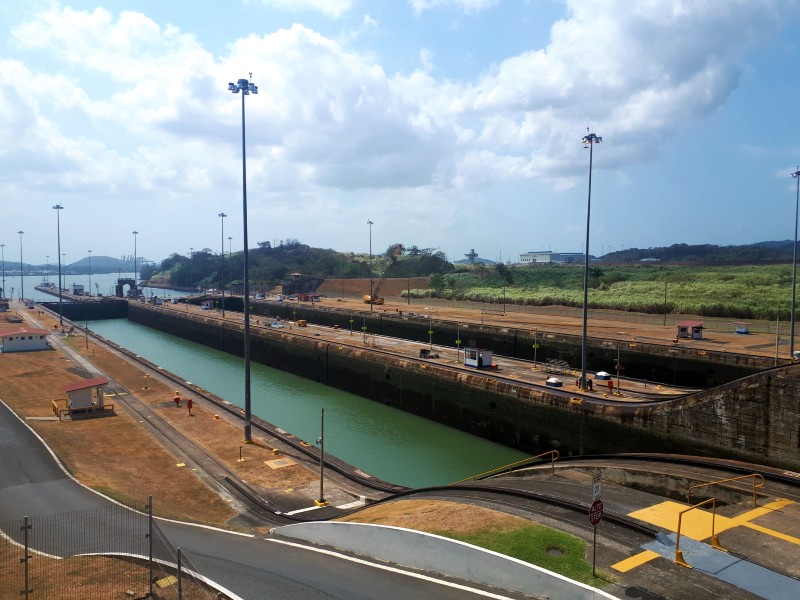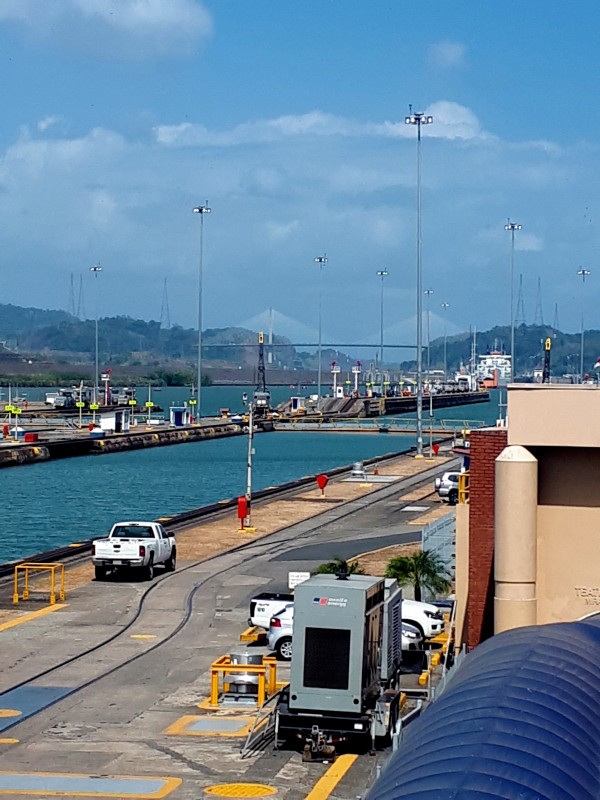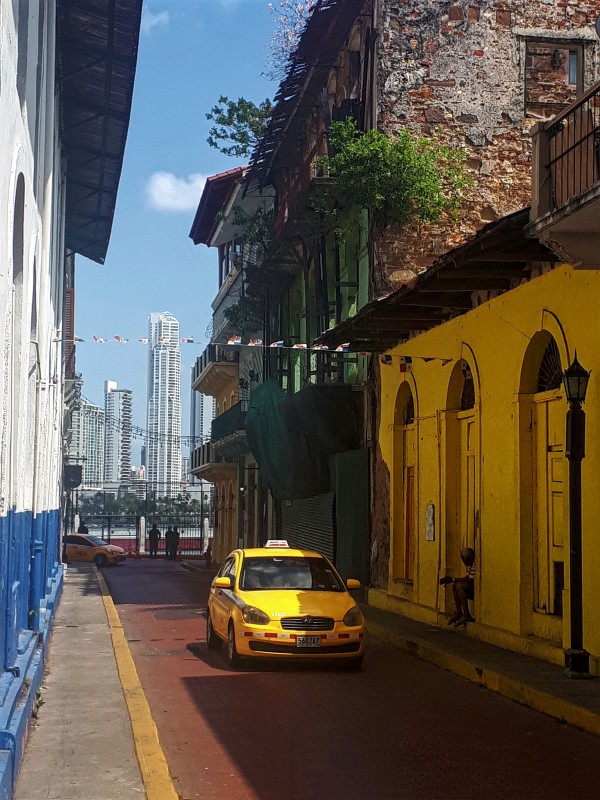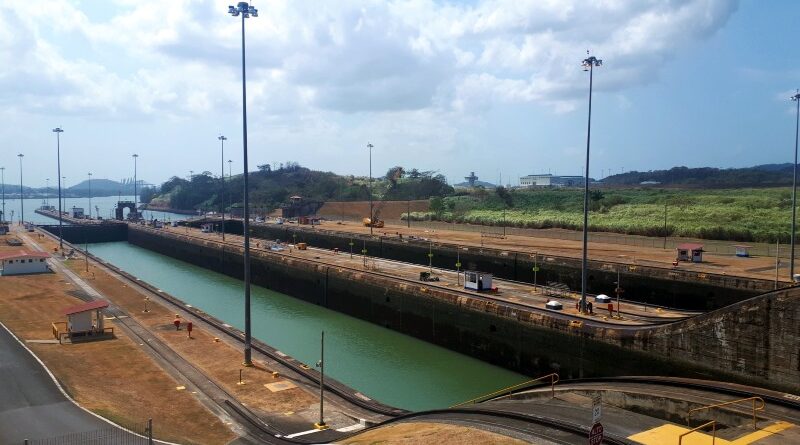How to Visit the Miraflores Locks on the Panama Canal
In this destination report, we will visit the Miraflores Locks on the Panama Canal.
Panama Canal
Panama’s greatest claim to fame is without doubt the Panama Canal. This 50-mile-long canal (82km) cuts across the isthmus of Panama where the distance between the Pacific Ocean and Atlantic Ocean (or technically speaking the Caribbean Sea) is the shortest.
It’s a major waterway for international shipping and of vital importance not only for the economy of Panama but for the entire world trade.
Visiting the Panama Canal
There are lots of places where you can view the Panama Canal, with the most obvious places being of course one of the six locks which lift the ships up 85 feet (26 metres) and down again at the other side.
On the Caribbean Sea you have the Gatun Locks consisting of three chambers, while on the pacific side there are the Miraflores Locks closest to the ocean (two chambers) and the single-chamber Pedro Miguel Locks just a mile or so further inland.
When staying in Panama City, the Miraflores Locks are the locks which are closest by, easiest to reach and overall best to visit as there is an entire visitors’ centre and museum at the complex.

How to reach the Miraflores Locks?
Although there are plenty of tour outfits offering guided tours to the Panama Canal, in reality this isn’t really necessary as it is easy to visit it by yourself.
By far the easiest option is to take a taxi or to use a ridesharing app like Uber. I ended up using Uber, paying 7.50 USD for the ride from my hotel in the El Cangrejo district to the Miraflores Locks.
Alternatively, the hourly bus C810 connects the Albrook bus station in Panama City with the Miraflores Locks. Being the centre of Panamanian bus transport and located on a metro line, Albrook should be easy enough to reach wherever you are in the city, although given the convenience of a taxi I wouldn’t personally bother with public transport.
Miraflores Locks
The Miraflores Locks consists out of two chambers lifting ships up 54 feet (16.5 metres) from the Pacific Ocean into Miraflores Lake. If you want to view the locks you have to pay an entrance ticket, which also gives you access to the on-site museum. The entrance fee is a steep 20 USD for non-residents.
Fun fact for those who do not know: the official currency in Panama is the Balboa, which is pegged 1:1 to the US Dollar. Both currencies are legal tender in Panama, although as there are no Balboa banknotes (just coins of 1 Balboa and smaller). This means that basically all transactions are conducted in dollar bills – with only the cents given back being Balboa coins!
Visitors’ centre
Once inside the Miraflores visitors centre you can access a viewing platform from where you have good views over the locks. At the time I arrived (shortly after noon) there were unfortunately no ships passing through the locks as it turned out there was some kind of lull between the morning and late afternoon traffic.
If you want to actually see ships passing through, you have to visit before 10am for the morning transits or after 2.30pm for the afternoon transits.
It was a pity not being able to see any ships – which was mostly due to my own fault of not realising that shipping traffic through the locks is not a continuous operation. Just be warned so you don’t make the same mistake as I did! That said, I still did enjoy the views over the mighty locks.




Museum
Even though not seeing any ships was a disappointment, the interesting on-site museum made up for it as it had a few interesting exhibitions and was neatly set-up.
The interactive museum has some interesting artefacts, old pictures and props and tells in great details the story behind the construction of the Panama Canal. I especially thought that the plight of the workers and infrastructural challenges were well-displayed and made clear what kind of engineering feat the Panama Canal really is.
It were the French who first began with work on the canal in 1881, although they quickly surrendered due to engineering issues and the high mortality rate among construction workers.
The United States took over from France in 1904 and finished the massive project in 1914, greatly reducing shipping distances between the Pacific and Atlantic as the dangerous route along Cape Horn on the southern tip of South America became obsolete.
As it was such a vital waterway from both a geopolitical and commercial point of view, the US Government kept the Panama Canal Zone under their control for many years, having the status of an. unincorporated territory of the United States. Interestingly, former US Senator and presidential candidate John McCain was born in the zone as his father served as a navy officer there
Only on 31st December 1999 did Panama take over full control of the waterway from the USA after guaranteeing permanent neutrality and free shipping.

Getting back to Panama City
As the Miraflores Locks are located just outside of the city proper, my Uber driver had offered to wait for me at the parking lot for the ride back into the city – which I agreed to after negotiating a cash fare.
If you arrive by Uber, this is by far the easiest option as hailing a new car through the app might be a bit difficult given the out-of-city location.
There were however plenty of normal taxis lurking at the parking lot of the Miraflores Locks if you require one, although the price would probably depend on your negotiation skills and command of the Spanish language.
After a relatively short ride my Uber dropped me off at the entrance of the old town of Panama City – the Casco Viejo – which would be next on the list to explore.

In short
The Miraflores Locks on the Panama Canal makes for an easy visit if you find yourself in Panama City.
These locks are within striking distance of the city and have good public transport links, although taking a taxi or Uber is an equally affordable option and much more convenient.
Make sure you visit either in the early morning or late afternoon when the locks are open for shipping. As I only arrived at noon there was temporarily no shipping traffic, which was kind of a disappointment and made for an underwhelming viewing experience – although that mistake was entirely mine.
That said, the museum makes for an interesting visit and does give a good overview of the massive scale of the project when construction began more than a century ago.
Even though the entrance fee is rather steep at 20 USD, I still think the Panama Canal is a must-see sight for everyone making a visit to the country.
Trip report index
This article is part of the ‘A Piece of Panama With a Bit of Bogota and a Slice of San Jose‘ trip report, which consists of the following chapters:
1. Review: Air France Economy Class Bucharest to Paris (Airbus A320)
2. Review: Air France Business Lounge Paris CDG Airport Terminal 2E – Hall K
3. Review: Air France Economy Class Paris to Bogota (Boeing 787)
4. Review: Hotel Morrison 114, Bogota, Colombia
5. A Short One-Day Stopover in Bogota, Colombia
6. Review: Copa Club Bogota Airport, Colombia
7. Review: Copa Airlines Economy Class Panama to Bogota (Embraer RJ-190)
8. Review: Tryp by Wyndham Panama Centro
9. How to Visit the Miraflores Locks on the Panama Canal (current chapter)
10. Into the Casco Viejo – Exploring Panama City’s Old Town Centre
11. Isla Taboga: A Day Trip to the Island of Flowers
12. A Panama Day Trip to the Portobelo Forts and Tropical Isla Mamay
13. Review: Copa Club Panama Tocumen International Airport
14. Review: Copa Airlines Economy Class Panama to San Jose (Boeing 737-800)
15. Destination San Jose: A Day in the Capital of Costa Rica
16. Review: VIP Lounge Costa Rica, San Jose Airport (SJO)
17. Review: KLM Economy Class San Jose to Amsterdam (Boeing 787)
18. Review: KLM Crown Lounge (Non-Schengen) Amsterdam Airport
19. Review: KLM Economy Class Amsterdam to Bucharest (Boeing 737-800)


Hi! This sounds like an amazing experience!! I was wondering if you went during COVID. The only reason I’m asking is because on the internet It says the Miraflores Locks is temporarily closed.
Thanks!
Hi! No, it was some 2-3 years ago. I can imagine that it is temporarily closed, as the visitor’s terrace is part of the museum and thus an ‘indoor space’ – and such places were closed in many countries in the world during the worst of the pandemic. Whether it is still closed or it has reopened again I don’t know!